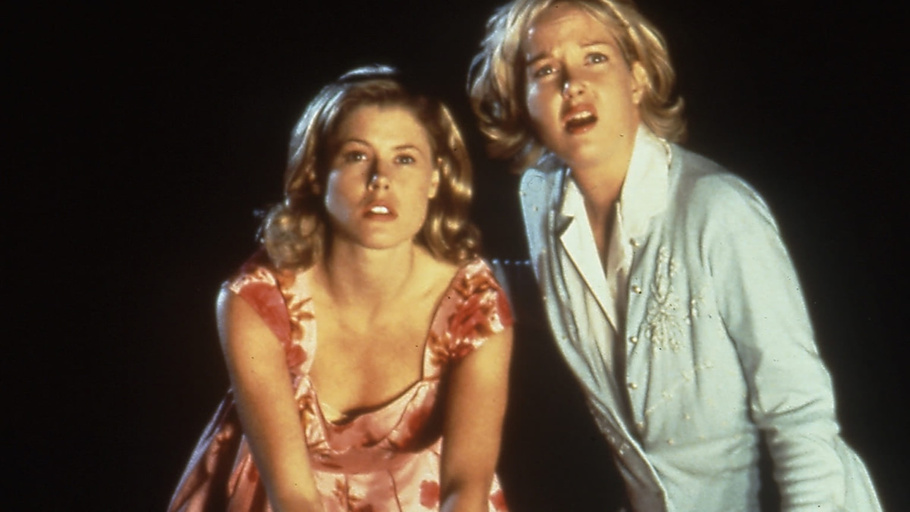
Runaway Daughters (1994) opens with a montage of black and white news footage and television commercials set to the tune “Let The Good Times Roll” before segueing into a drive-in movie. In two minutes director Joe Dante has compressed the popular concepts of fifties’ culture into a recognizable image set that’s thrown into comic relief via the juxtaposition of sound and image. Runaway Daughters is as much a celebration of youth in revolt films from the fifties as much as it is a playful dissection of modes and mechanisms associated with that B-Movie sub-genre.
After working predominantly on theatrical features in the eighties, Dante began working in television in the nineties on the short lived cult series Eerie, Indiana (1991) and the films Runaway Daughters and The Second Civil War (1997). Produced by Debra Hill, Runaway Daughters was one in a series of films commissioned by Showtime to remake classic American International pictures for the nineties. Of course Joe Dante, a gifted cinephile and staunch post-modernist, has peppered his film Runaway Daughters with allusions to the AIP films of the fifties and sixties.
In the film is a gas station called “American International Petrol”. Dante also casts AIP producers Roger Corman and Samuel Z. Arkoff in brief cameos. Heartthrob Fabian, who appeared in some AIP films in the late sixties, also appears in Runaway Daughters. In addition to these cast members Joe Dante also enlisted his own frequent collaborators Dick Miller, Dee Wallace, Robert Picardo, Cathy Moriarty, and Christopher Stone to appear in this remake of the AIP classic.
Despite his many homages too Corman and Arkoff, Dante’s film is still very much a film by Joe Dante. Dante even configures the plot of his film around a historic event (Sputnik) in much the same way that the Cuban missile crisis figures in the plot of his earlier film Matinee (1993). The relationship between popular media and history is paramount to Dante’s films from this period. Like Matinee, Runaway Daughters re-imagines political history (Sputnik) as private history (pregnancy) which is acted out and negotiated by its characters through narrative tropes that were born out of a reaction to the aforementioned public political history.
Unlike the majority of Joe Dante’s films Runaway Daughters is female focused as it follows a trio of best friends on their road trip (Julie Bowen, Holly Fields, and Jenny Lewis). The influence of Debra Hill is felt throughout Runaway Daughters in how the film addresses the distinctly female experiences of the three main characters. Hill allows Dante to play with the genre as he wishes while she presumably safe guarded the integrity of these female characters.
Regrettably, Runaway Daughters has become something of an overlooked gem in the filmographies of Joe Dante and Debra Hill. As Dante himself often laments on his podcast, the made-for-television films of the eighties and nineties have rarely been properly preserved and have become not only scarce, but they exist in highly compromised forms. Runaway Daughters, though not unavailable, does not exist as either Joe Dante or Debra Hill intended.
